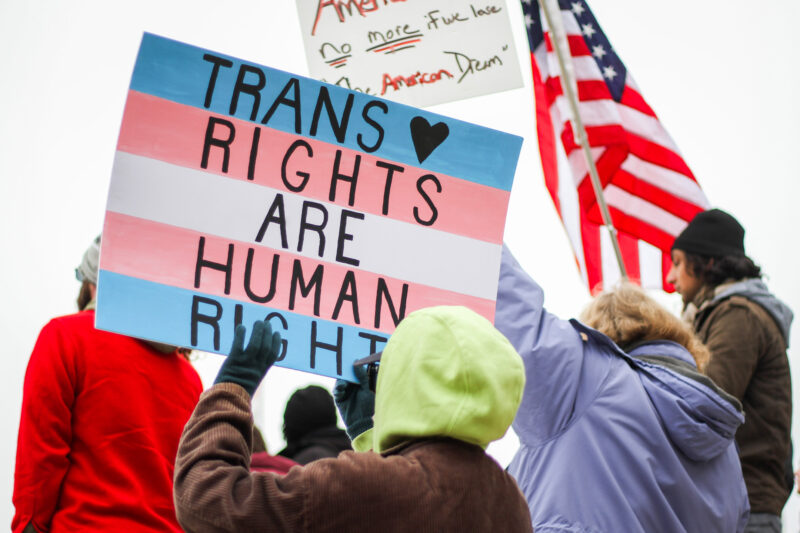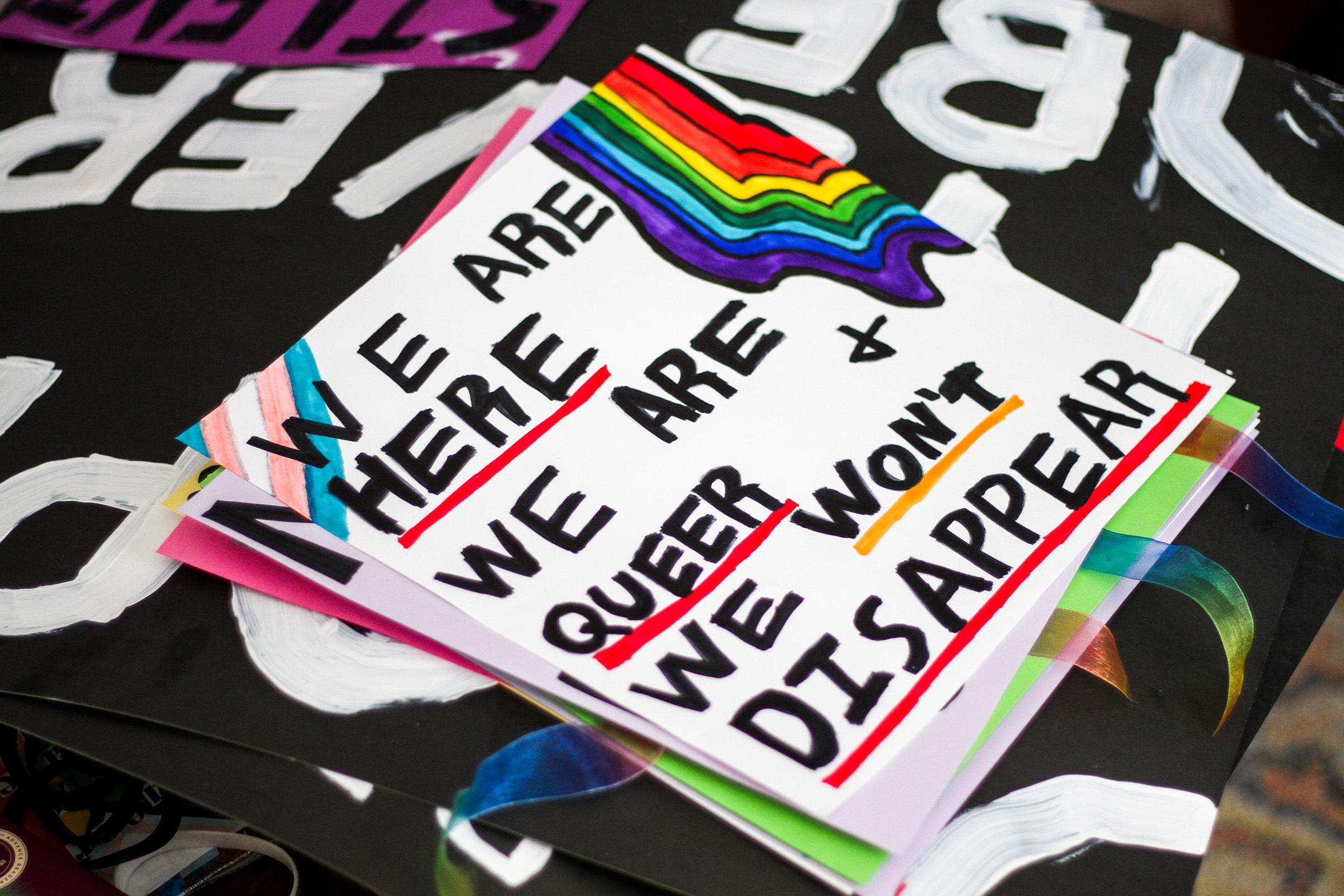Meet the Missouri Residents Fighting Against Anti-Trans Bills
As the Missouri legislature reviews at least 39 anti-LGBTQ+ bills in its pipeline, some Missourians are protesting the legislation.

This story is part of our monthly series, Campus Dispatch. Read the rest of the stories in the series here.
On March 1, at a protest in Columbia, Missouri, Central Trans Action Bloc founder Harry Castillow took the microphone. He introduced himself as a cisgender, straight, white male, earning cheers and laughter from the crowd.
“I am here because there are people that I love here,” Castillow, the father of a transgender child, said. “I’m here because there are people that I care for, and I don’t understand why there aren’t more people here doing the same thing.”
The protest was part of a statewide effort led by the Missouri Democratic Party LGBTQ+ Caucus. More than 200 LGBTQ+ community members and allies huddled between the Roger B. Wilson Boone County Government Center and the Boone County Courthouse as Castillow continued his speech.
The protests come amid a years-long effort to target the LGBTQ+ community with restrictive laws. In Missouri, the cycle hits every spring like clockwork: Legislators file a slew of bills targeting the LGBTQ+ community, and the groups affected by the legislation are left to figure out their next steps. The state currently has 39 anti-LGBTQ+ bills being reviewed or making their way through the legislative process, according to the American Civil Liberties Union. Many of the potential policies are aimed directly at transgender Missourians.
Some of the major bills include proposals to cement bans on transgender minors’ access to gender-affirming care and ability to participate on sports teams that align with their gender identities. Another bill targets drag performers and drag shows.
“It’s exhausting,” said Mel Constantine Miseo, a board member of the Center Project, mid-Missouri’s sole LGBTQ+ community center. “But we have to keep fighting and doing everything we can.”
A few years ago, Constantine Miseo was able to pay for top surgery. They described feeling dissociated from their body before the surgery, and they said that afterwards, they felt more confident and willing to be more open with any sort of relationship.
“I just keep thinking, ‘Okay, they can’t take that away from me,’” Constantine Miseo said. Then, they immediately think about the people who haven’t been able to get surgery yet. “And it’s scary to think about the possibility of that being taken away from them,” they said.
Surgeries aren’t the only form of gender-affirming care. Gender-affirming hormone therapy, sometimes called hormone replacement therapy, can help someone manage their hormone levels by increasing estrogen levels and lowering testosterone in the body. For others, hormone therapy could also include trying to increase testosterone levels. Some rely on estrogen and testosterone blockers.
In 2023, Missouri enacted laws banning transgender youth from receiving gender-affirming care and from playing on sports teams based on their gender identity. Republicans compromised with Senate Democrats to set the laws to expire in 2027, the Associated Press reported.
But Senate Bill 10 aims to remove the expiration dates from those laws, along with more than 20 others. The Missouri state senate approved the bill with a 22-12 vote, largely split along party lines.
In early February, a Missouri House committee heard more than seven hours of testimony on seven bills seeking to permanently restrict young transgender people’s access to gender-affirming care and sports teams, KCUR reported. Four of these bills would eliminate the expiration date on the ban preventing transgender minors from accessing gender-affirming treatments like puberty blockers and hormones.
For transgender children and their families, the future remains uncertain. Much of the anxiety surrounding the bills stems from uncertainty about how the legislation would be enforced or interpreted. In response, protests and demonstrations, like the one Castillow spoke at, have popped up across the state since the 2025 Missouri legislative session began.

On the morning of the Columbia protest, the Center Project’s kitchen counters held a spread of wrapped breakfast food. In one room, community members stood with markers and pens over brightly colored protest signs. Ashley Bramon, the mother of a transgender son and a gender-fluid child, traced out “trans rights are human rights” on a poster board. She wore a handmade necklace with the words “ally” displayed in beads. Later in the day, she attended the protest in support of her kids.
“It’s important that they have a chance to have their rights,” Bramon said. “And I think it’s important to show legislators that they have an obligation to us, too … for them to realize how many of us they’re affecting.”
Organizers stood in the other front room of the Center Project, going over the lineup of speakers.
“I’m absolutely terrified about the LGBTQ+ related bills,” said Nik, a co-organizer of the protest who asked to only be identified by her first name. “Specifically the trans bills that are starting. But I think that people don’t realize that a lot of legislation is targeting the trans community right now, because they seem like the most ‘other’ compared to the majority of voters.”
Local entertainer and drag queen Veronika Versace, former Miss Gay Missouri USofA, also spoke to the crowd on March 1. Versace highlighted SB 295, which targets drag performers and drag shows.
“The language of these bills not only impacts just me doing my shows or reading to kids at a story hour, but it impacts our community as a whole in a negative way,” Versace said on stage.
According to the bill, an “adult cabaret performance” includes things like topless and exotic dancing, stripping, and drag shows. The bill labels these performances as “entertainment that appeals to prurient,” or sexual, interests. It doesn’t matter whether the performance is paid or not—and the bill essentially equates drag shows, regardless of the presence of minors, to taking children to venues like strip clubs.
The bill follows criticism of a 2023 Nclusion+ event, where drag queens performed at a City of Columbia diversity event attended by middle school students. Missouri Attorney General Andrew Bailey wrote letters to the mayor of Columbia and the superintendent of Columbia Public Schools, accusing them of violating state law by allowing middle school students to watch an “adult-themed” drag show.
However, some worry the wording of the bill is vague enough that it could target drag performers and transgender community members at large.
“The language in that bill is so vague that they could sit here and justify that what I’m doing in front of you is a misdemeanor offense. The second time, that could be a felony charge,” Versace said at the protest. “You’re saying that a trans person walking down the street in the clothing that they feel comfortable in could be … criminalized.”
Every summer, the Center Project hosts fundraisers to raise money for its emergency fund. This fund helps community members facing urgent needs, and while it mainly raises money for general emergencies, it has also occasionally helped families who had to leave the state because of anti-trans and other anti-LGBTQ+ laws.
“Some people are seriously considering leaving the state, which is a shame because this is their home too,” Constantine Miseo said. “Not only trans people, but also people in same-sex queer relationships are worried now about the safety of their families, their rights over their kids and their marriages, and all of that.”
Constantine Miseo added that in times of distress, they’re an organizer, noting that with support and connections, it ultimately comes down to community. It’s a feeling shared by the Missourians who are stuck waiting right now.
“This is not the first time that groups of people have had to fight for their rights to be protected,” Nik said. “We’ve always overcome that by coming together as a community, and for people who it doesn’t directly affect to also stand up and say something.”
